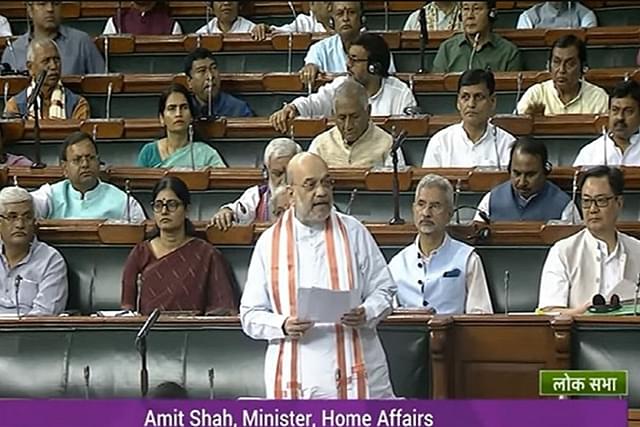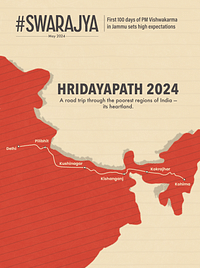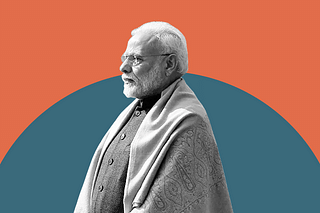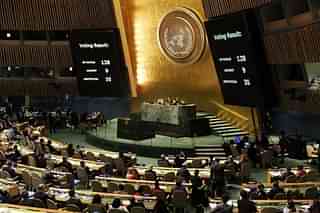Politics
Needless Flutter Over The Three New Nyaya Samhitas
Venu Gopal Narayanan
Aug 13, 2023, 04:00 PM | Updated 04:08 PM IST
Save & read from anywhere!
Bookmark stories for easy access on any device or the Swarajya app.

The tabling of three major bills in the Lok Sabha by the Union Home Minister, Amit Shah, on 11 August, formally initiated a legislative process of major judicial reforms.
He informed the house that the Indian Penal Code (IPC), 1860, will be replaced by the Bharatiya Nyaya Sanhita (BNS) Bill, 2023, the Criminal Procedure Code (CrPC), 1898, will be replaced by the Bharatiya Nagarik Suraksha Sanhita Bill, 2023 and the Indian Evidence Act, 1872, will be replaced by the Bharatiya Sakshya Bill, 2023.
This is a most welcome step since these reforms were long overdue by decades.
Their intents are numerous. A fundamental change is a recasting of the laws to focus on the protection of citizens and their interests, rather than punishing them, which was the original intent of such laws framed by a colonial power.
Other reforms include a greater emphasis on forensic studies for solving crimes, the abolition of the sedition law, time limits for hearings and delivery of judgments, raising of conviction levels, the reduction of possibilities for political interference, and, perhaps most hearteningly, a roadmap for closing the countless cases which clog our courts.
These three bills have the potential to speed up the justice delivery system by a great deal, make it more impartial, more transparent, and more resolute.
However, they still have a long journey ahead of them before they become laws: the bills have to go to a standing committee of parliament, the Law Commission, and the Bar Council, before finally being debated in parliament, passed, and enacted.
Yet oddly, even with so many levels of scrutiny pending, and as many opportunities for changes, corrections, and improvements to these three bills, loud, now-mandatory howls of indignant dissonance rose instantly from certain sections of society.
These howls can be categorised into a few broad trends, and collectively placed in the attention-seeking-early-bird column.
One prominent television journalist revealed his ideological inclinations, and his target audience, with a single word: “Saffronisation!”
How he arrived at that conclusion shall remain one of the great mysteries of life since, the three bills have nothing to do with Hindutva, Hindu majoritarianism, any sort of political ideology for that matter, or any other pet-peeve of the usual suspects.
Instead, they are filled only with dreadfully-dreary, near-pedantic definitions of crimes, strict legal procedures to be followed, and punishments to be levied.
Another set contested the Home Minister’s declaration, that the odious sedition law now stood to be repealed by the new bills. They said that sedition, far from going, had only returned in a more sinister form.
This is incorrect. Section 124A of the IPC defines sedition as disaffection against the government of India in rather vague terms. That is why it was always viewed with much dread, and prone to misuse (which is precisely what the British needed to keep Indians under check).
But its draft replacement, section 150 of the BNS, is unambiguous: it clearly defines such acts (without using the word sedition) as those which endanger the sovereignty, unity, and integrity of the country, through specifically defined actions like secession, subversion, separatism, or armed rebellion.
For good measure, the bill also says that the funding of such acts are cognisable offences which could attract a life sentence.
Now, in an age where enough agencies and narrative-builders are actively engaged in fomenting precisely such proscribed acts in India, this is the best it is going to get.
And if that is still not good enough, then they can always log onto social media and howl to their hearts’ content. That may seem like a callous comment, but unfortunately, organised efforts to destabilise India, spanning not just the country, but the globe as well, is the reality we have to live with. And stern laws are needed to counter them.
A third set took the mischief-making route with section 195 of the new BNS (old IPC).
It deals with ‘imputations and assertions which are prejudicial to national integration’, which is basically legalese for preventing the demonisation, vilification, or ostracisation of selected communities.
This lot said, rather outrageously, that the section would lead to a situation wherein Hinduphobia could be propagated, but criticism of other faiths couldn’t.
Apart from the obvious question of why any normal person would ever wish to criticise another faith, this is an absurd reading of section 195, and entirely incorrect.
Readers are invited to read the bill for themselves, and confirm that there is nothing in this section, no matter how it is read, which leads to such an outlandish, and frankly inflammatory, inference.
Instead, the truth is that section 195 of the BNS is nothing but section 153B of the IPC, with an additional clause forbidding the publication of false or misleading information.
It makes us think whether the new clause, which lay at the core of so much angst, was inserted to tackle precisely such trouble-makers? If yes, then it is a masterful addition which has proved its utility even before the section becomes law!
Then, beyond instigative readings of the three bills, came Tamil Nadu Chief Minister MK Stalin tweet that the bills’ Hindi-Sanskrit titles reeked of linguistic imperialism.
While he had no comments to offer on the content of the bills in his lengthy rant, it was enough to rouse the ‘Hindi imposition’ brigade into rants of their own.
So much so, that even a normally-reserved former editor of a Chennai-based English language daily let her Lemming instincts rush to the fore.
To them, it didn’t matter that the text of the bills was in their beloved English, or, that the content of the bills would lead to a much-awaited reform of the judicial system; instead, legislative intent was ludicrously side-lined by a fresh opportunity to deepen social divides.
And in that rush, they inadvertently revealed their own intentions in greater measure than an editorial or a speech ever could.
These responses were thoroughly outclassed by a fourth lot who chose to nit-pick on the grammar of the bills, and point out typographical errors. Yes, it is true that there are a number of typos in the bills, and, that the phraseology of some sections can be improved upon.
But, honestly, is it a bigger issue than the bills’ contents, especially when these are only preliminary drafts which now have to pass through multiple levels of scrutiny and correction, or, is that all they can manage by way of a response?
Again and again, we see that certain sections have become programmed to see only wrong in anything this government does, with no heed to the damage such low-grade responses have on their credibility.
Instead of taking pride in the fact that the word ‘Sanhita’ was used in homage to our ancient civilisational ethos (it means a collection of texts on a particular subject), such sorts wilfully distort the benign intent to portray its usage as some kind of sinister effort at ‘Saffronisation’.
Perhaps then, in conclusion, it is time we accept that these howls of mandatory dissonance have today become a permanent feature of our society.
This level of wilful obtuseness by an all-knowing ‘nescienti’ is an incurable Pavlovian response we will have to suffer to contain in this digital age, since, there will always be a voluble body which rails against anything and everything, more wrong than right, more negativist than constructively critical, misleading, misguiding, provoking, instigating, and invoking strawman arguments, because that is all they are capable of.
Save & read from anywhere!
Bookmark stories for easy access on any device or the Swarajya app.
Venu Gopal Narayanan is an independent upstream petroleum consultant who focuses on energy, geopolitics, current affairs and electoral arithmetic. He tweets at @ideorogue.
Support Swarajya's 50 Ground Reports Project & Sponsor A Story
Every general election Swarajya does a 50 ground reports project.
Aimed only at serious readers and those who appreciate the nuances of political undercurrents, the project provides a sense of India's electoral landscape. As you know, these reports are produced after considerable investment of travel, time and effort on the ground.
This time too we've kicked off the project in style and have covered over 30 constituencies already. If you're someone who appreciates such work and have enjoyed our coverage please consider sponsoring a ground report for just Rs 2999 to Rs 19,999 - it goes a long way in helping us produce more quality reportage.
You can also back this project by becoming a subscriber for as little as Rs 999 - so do click on this links and choose a plan that suits you and back us.
Click below to contribute.





